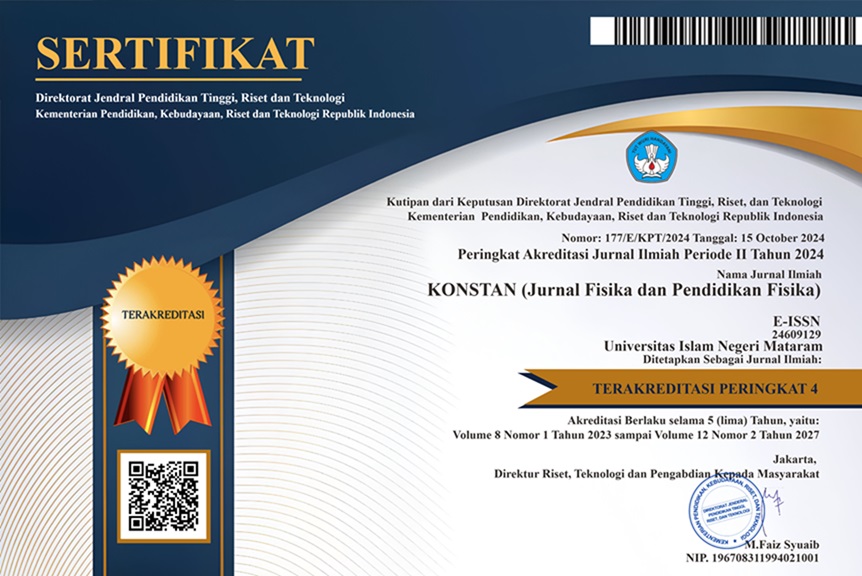Enhancing Physics Learning with Advance Organizer: A Meta-Cognitive Approach
Abstract
Physics education often presents challenges for students due to its abstract and complex nature. Many students struggle to comprehend the interrelationships between concepts and tend to memorize formulas without developing a deep conceptual understanding. This study aims to evaluate the effectiveness of the Advance Organizer as a metacognitive approach to enhance students' scientific literacy, conceptual understanding, and mathematical communication skills. The research method employed is Research and Development (R&D) using the 4D model (Define, Design, Develop, and Disseminate), combined with a quasi-experimental design employing the Nonequivalent Control Group Design. The developed instructional materials include lesson plans (RPP), student worksheets (LKPD), interactive visual-based learning media, and assessment instruments. The findings indicate that students in the experimental group using the Advance Organizer demonstrated significantly greater improvements in conceptual understanding compared to the control group. The average scientific literacy score increased from 71.88 to 83.22 (N-Gain = 0.40, moderate category), while mathematical communication skills improved from 68.03 to 79.38 (N-Gain = 0.35, moderate category). Statistical analysis using Hotelling’s T² test revealed a significant difference between the experimental and control groups (F = 14.755, p < 0.05), while effect size analysis using Cohen’s f showed a large impact on scientific literacy (f = 0.625) and a moderate impact on mathematical communication (f = 0.342). Although this strategy proved effective, several challenges were identified, including students' initial difficulties in adapting to active learning methods and the need for teacher training in designing optimal Advance Organizers. This study recommends integrating the Advance Organizer with digital technology and further exploring its application across various physics topics to enhance the effectiveness of metacognitive-based learning.
Downloads
References
[2] C. Singh, “Interactive video tutorials for enhancing problem solving, reasoning, and meta-cognitive skills of introductory physics students,” arXiv preprint, arXiv:1602.07746, 2016. [Online]. Available: https://arxiv.org/abs/1602.07746
[3] A. Thahir, R. Diani, and D. Permana, “Advance organizer model in physics learning: Effect size test on learning activities and students' conceptual understanding,” J. Phys. Conf. Ser., vol. 1467, p. 012076, 2020. doi: 10.1088/1742-6596/1467/1/012076
[4] A. Harjono, Hikmawati, and I. K. E. Putra, “The effect of advance organizer model on physics learning outcomes in terms of prior knowledge,” J. Sci. Sci. Educ., vol. 5, no. 1, pp. 61–65, 2024. doi: 10.29303/jossed.v5i1.5563
[5] D. P. Ausubel, Educational Psychology: A Cognitive View. New York: Holt, Rinehart & Winston, 1968.
[6] R. Subramaniam, R. Mahmud, and Z. Ismail, “Cognitive load reduction through advance organizers in physics education,” Sci. Educ. Rev., vol. 32, no. 4, pp. 201–220, 2021.
[7] C. Hmelo-Silver, “Problem-based learning: What and how do students learn?,” Educ. Psychol. Rev., vol. 16, no. 3, pp. 235–266, 2004.
[8] M. Pedaste et al., “Phases of inquiry-based learning: Definitions and the inquiry cycle,” Educ. Res. Rev., vol. 14, pp. 47–61, 2015.
[9] K. S. Alzahrani, “The impact of advance organizers in virtual classrooms on the development of students' integrated science process skills,” Education and Information Technologies, vol. 28, no. 2, pp. 1235–1254, 2023. doi: 10.1007/s10639-022-11042-3
[10] A. P. A. Wibowo, *Efektivitas model pembelajaran advance organizer berbantuan media video interaktif terhadap hasil belajar fisika materi gerak lurus*, Skripsi, Universitas Islam Negeri Walisongo Semarang, 2019.
[11] X. Zheng and R. Gardner, “Virtual reality-enhanced advance organizer for conceptual learning in science education,” Educational Technology & Society, vol. 25, no. 3, pp. 112–128, 2022.
[12] F. Amir and A. Saddia, “Penerapan model pembelajaran advance organizer berbantuan artificial intelligence (AI) terhadap peningkatan pemahaman konsep mahasiswa pendidikan fisika Universitas Sulawesi Barat,” Jurnal Teknologi Pendidikan, vol. 17, no. 2, pp. 123–135, 2024.
[13] I. A. Darmawan and Y. Dwijayati, “Aplikasi model advance organizer berbantuan media PhET berbasis kemampuan berpikir kritis siswa terhadap hasil belajar,” Gravity: Jurnal Ilmiah Penelitian dan Pembelajaran Fisika, vol. 5, no. 2, pp. 31–36, 2019.
[14] H. Hatika, “Peningkatan hasil belajar fisika dengan menerapkan model pembelajaran advance organizer berbantu animasi komputer,” Jurnal Pendidikan Fisika Indonesia, vol. 9, no. 1, pp. 1–7, 2013.
[15] S. Thiagarajan, *Instructional Development for Training Teachers of Exceptional Children: A Sourcebook*, Bloomington, IN: Indiana University, 1974.




.png)
